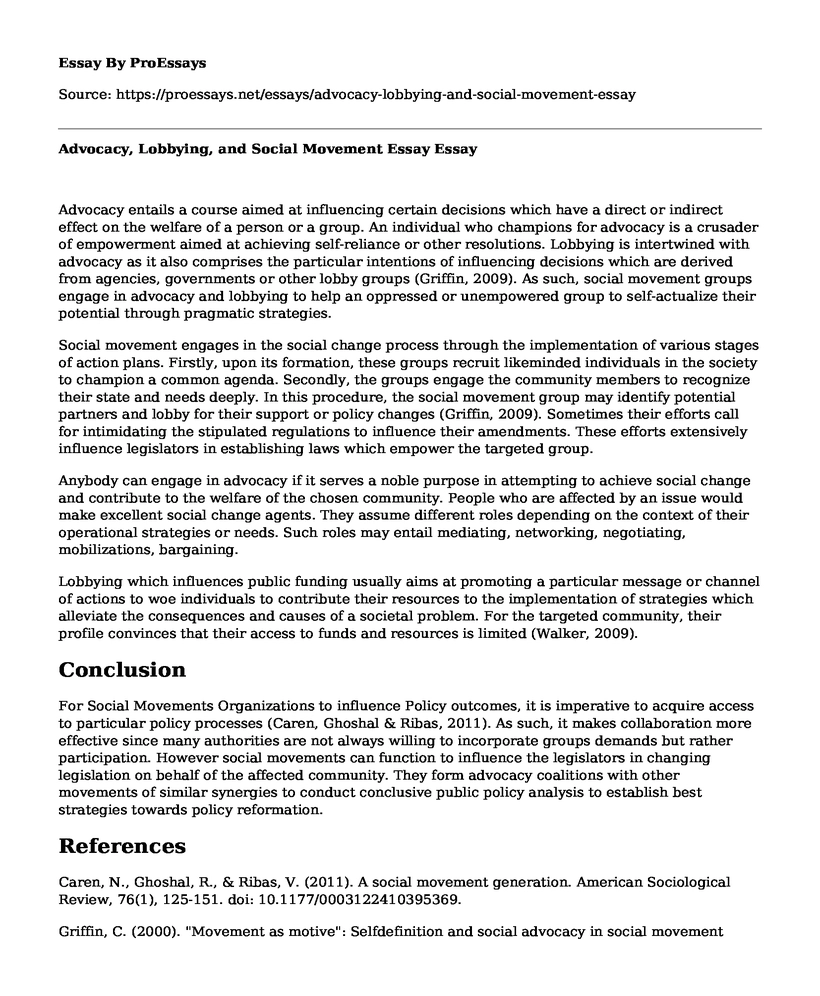Advocacy entails a course aimed at influencing certain decisions which have a direct or indirect effect on the welfare of a person or a group. An individual who champions for advocacy is a crusader of empowerment aimed at achieving self-reliance or other resolutions. Lobbying is intertwined with advocacy as it also comprises the particular intentions of influencing decisions which are derived from agencies, governments or other lobby groups (Griffin, 2009). As such, social movement groups engage in advocacy and lobbying to help an oppressed or unempowered group to self-actualize their potential through pragmatic strategies.
Social movement engages in the social change process through the implementation of various stages of action plans. Firstly, upon its formation, these groups recruit likeminded individuals in the society to champion a common agenda. Secondly, the groups engage the community members to recognize their state and needs deeply. In this procedure, the social movement group may identify potential partners and lobby for their support or policy changes (Griffin, 2009). Sometimes their efforts call for intimidating the stipulated regulations to influence their amendments. These efforts extensively influence legislators in establishing laws which empower the targeted group.
Anybody can engage in advocacy if it serves a noble purpose in attempting to achieve social change and contribute to the welfare of the chosen community. People who are affected by an issue would make excellent social change agents. They assume different roles depending on the context of their operational strategies or needs. Such roles may entail mediating, networking, negotiating, mobilizations, bargaining.
Lobbying which influences public funding usually aims at promoting a particular message or channel of actions to woe individuals to contribute their resources to the implementation of strategies which alleviate the consequences and causes of a societal problem. For the targeted community, their profile convinces that their access to funds and resources is limited (Walker, 2009).
Conclusion
For Social Movements Organizations to influence Policy outcomes, it is imperative to acquire access to particular policy processes (Caren, Ghoshal & Ribas, 2011). As such, it makes collaboration more effective since many authorities are not always willing to incorporate groups demands but rather participation. However social movements can function to influence the legislators in changing legislation on behalf of the affected community. They form advocacy coalitions with other movements of similar synergies to conduct conclusive public policy analysis to establish best strategies towards policy reformation.
References
Caren, N., Ghoshal, R., & Ribas, V. (2011). A social movement generation. American Sociological Review, 76(1), 125-151. doi: 10.1177/0003122410395369.
Griffin, C. (2000). "Movement as motive": Selfdefinition and social advocacy in social movement autobiographies. Western Journal of Communication, 64(2), 148-164. doi: 10.1080/10570310009374669.
Walker, E. (2009). Privatizing participation: Civic change and the organizational dynamics of grassroots lobbying firms. American Sociological Review, 74(1), 83-105. doi: 10.1177/000312240907400105.
Cite this page
Advocacy, Lobbying, and Social Movement Essay. (2022, Jul 01). Retrieved from https://proessays.net/essays/advocacy-lobbying-and-social-movement-essay
If you are the original author of this essay and no longer wish to have it published on the ProEssays website, please click below to request its removal:
- The Constitution, The Bill Of Rights, And The Amendments
- Essay Sample on the Legalization of Marijuana
- High Cost of Health Care Essay
- Policies of Social Media in India Paper Example
- Essay Sample on Government Shutdown
- US Infrastructure: Trump's Vision for Economic Growth - Essay Sample
- Essay Example on Free Speech: David Cole's Argument for Its Defense







